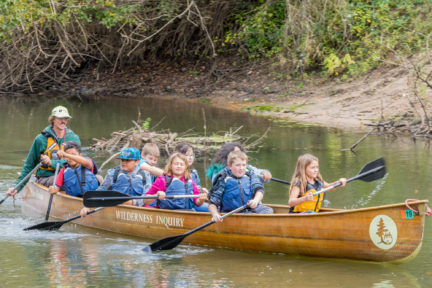Photography and writing: Peter MacMillan, Wilderness Inquiry
Canoemobile, hosted by the LaPorte County Soil and Water Conservation District, explored the “Myewes-zibiwe.” Where on earth is the Myewes-zibiwe? After an interim iteration, as “La Riviere du Chemin,” this exotic waterway is now named Trail Creek. Such an ordinary name does not lead to high expectations. Yet, an ordinary name is perhaps a symbolic reminder that within our own local “ordinary” waterways there are treasures to be discovered. Canoemobile is searching for those treasures with the help of students from Michigan City and La Porte School Districts. Top on the list of treasures for most students…turtles. Who can resist turtles?
So, how does a sleek 24-foot Voyageur canoe change kids’ perceptions about our local water resources? The canoes are a safe, historic and undoubtedly cool introduction to aquatic environments. Many of the students have never been in a canoe or even in a boat for that matter. There is a lot of suppressed, don’t let my friends notice, kind of nervousness as the kids enter the boats. They feel unsteady as they step inside. Yet as they concentrate on their strokes and find a rhythm, magic does happen. To them, this is an adventure.
Why are adventures important in life and education? For the kids in the canoe, there are two distinct experiences that truly make a morning on the water meaningful. First, without cooperation and teamwork, the massive Voyager canoes are difficult to maneuver. This lesson quickly becomes apparent to most fourth graders; when everyone pulls together things really start to happen. Second, students have the opportunity to learn the importance of stewardship in maintaining and improving our local and natural resources as they paddle. They get to physically feel the power and momentum that is generated by working together. At the same time, they experience their natural waterways with new intellectual curiosity. Fusing these two simultaneous experiences, they leave the river knowing they have the power to communally maintain and improve the habitats they paddled on.
While ‘immersion’ is often overused and maybe even a trite concept, it is hard not to apply the word to canoeing. There is no better way for these kids to experience the water than by bringing the water level to eye level. This change of perception enhances our ability to see things differently. All of a sudden, the grasses on the banks appear so tall and our paddles reach in amongst the weeds and fish. From this perspective, the world looks a bit different; it gets synapses firing perhaps even better than most video games. What kids discover through Canoemobile is that there is some sort of magic that takes place when being immersed in new physical, intellectual and emotional experiences outside of the classroom.



Leave a Reply